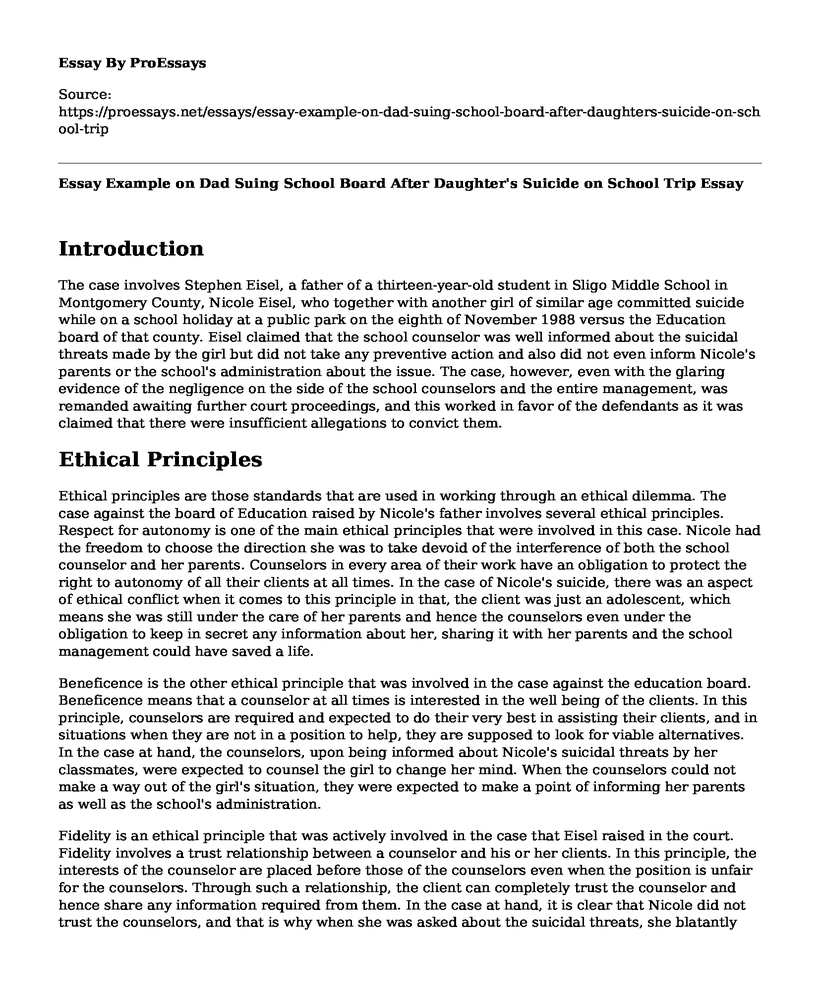Introduction
The case involves Stephen Eisel, a father of a thirteen-year-old student in Sligo Middle School in Montgomery County, Nicole Eisel, who together with another girl of similar age committed suicide while on a school holiday at a public park on the eighth of November 1988 versus the Education board of that county. Eisel claimed that the school counselor was well informed about the suicidal threats made by the girl but did not take any preventive action and also did not even inform Nicole's parents or the school's administration about the issue. The case, however, even with the glaring evidence of the negligence on the side of the school counselors and the entire management, was remanded awaiting further court proceedings, and this worked in favor of the defendants as it was claimed that there were insufficient allegations to convict them.
Ethical Principles
Ethical principles are those standards that are used in working through an ethical dilemma. The case against the board of Education raised by Nicole's father involves several ethical principles. Respect for autonomy is one of the main ethical principles that were involved in this case. Nicole had the freedom to choose the direction she was to take devoid of the interference of both the school counselor and her parents. Counselors in every area of their work have an obligation to protect the right to autonomy of all their clients at all times. In the case of Nicole's suicide, there was an aspect of ethical conflict when it comes to this principle in that, the client was just an adolescent, which means she was still under the care of her parents and hence the counselors even under the obligation to keep in secret any information about her, sharing it with her parents and the school management could have saved a life.
Beneficence is the other ethical principle that was involved in the case against the education board. Beneficence means that a counselor at all times is interested in the well being of the clients. In this principle, counselors are required and expected to do their very best in assisting their clients, and in situations when they are not in a position to help, they are supposed to look for viable alternatives. In the case at hand, the counselors, upon being informed about Nicole's suicidal threats by her classmates, were expected to counsel the girl to change her mind. When the counselors could not make a way out of the girl's situation, they were expected to make a point of informing her parents as well as the school's administration.
Fidelity is an ethical principle that was actively involved in the case that Eisel raised in the court. Fidelity involves a trust relationship between a counselor and his or her clients. In this principle, the interests of the counselor are placed before those of the counselors even when the position is unfair for the counselors. Through such a relationship, the client can completely trust the counselor and hence share any information required from them. In the case at hand, it is clear that Nicole did not trust the counselors, and that is why when she was asked about the suicidal threats, she blatantly denied ever pronouncing them.
Potential Consequences
After the court ruling that the case should be remanded awaiting further proceedings and its failure to uphold the availability of undeniable evidence of the negligence on the side of the school counselors, several issues are bound to come up. More suicidal cases may occur since the counselors do not see any need to follow up on shared information about suicidal threats and are aware that even in case of any aftermath, they will not get any reprimanding from the courts. There will be an aspect of adverse issues happening to children while at school since there is a heightened level of negligence on the part of the counselors in informing both the parents and the school management on any threats. The most viable option to avoid such consequences is ensuring that there are well-stipulated rules and regulations to direct counselors in school setups. The rules and regulations governing school counselors should be distinct from those that govern other bodies of counselors in the typical world.
Evaluation of the Course of Action the Court Took
The court decided to keep the case open, awaiting further evidences, allegations, and proceedings of which were not given any timeframe. There was enough evidence to support Eisel's claim that the counselors failed in that they did not communicate early enough about his daughter's suicidal threats, something that alone could have helped save her life. The court, however, was not willing to either reprimand the counselors not rule out that they were guilty as charged, but rather, it kept the case open. I disagree with the court's course of action and state that it would have been right to vindicate Eisel and offer him justice after losing his daughter as a result of the negligence on the part of the school counselors who not only defied their code of conduct but also failed to carry out their duties appropriately.
Cite this page
Essay Example on Dad Suing School Board After Daughter's Suicide on School Trip. (2023, Apr 24). Retrieved from https://proessays.net/essays/essay-example-on-dad-suing-school-board-after-daughters-suicide-on-school-trip
If you are the original author of this essay and no longer wish to have it published on the ProEssays website, please click below to request its removal:
- Research Paper on Decreasing Depression and Suicide through Extracurricular Activities
- Discussion on the Current Research That Links Patient Safety Outcome to ADN and BSN Nurses
- Essay Sample on My Values: Honesty, Love & Persistence
- International Students in Australia: Adjustment & Coping Skills Study - Research Paper
- Essay Example on Living With Personality Disorder: A Case Study of Jodie
- Essay Example on Houston ISD: A Leader in US Education Excellence
- Challenges of Bias in IQ Tests and Strategies for Addressing Worldview Conflicts in Professional Settings







